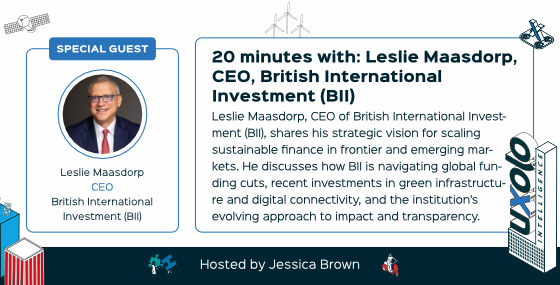CFLI report offers blueprint for unlocking climate finance in emerging markets
The report highlights opportunities for further public-private collaboration and pathways for policymakers to accelerate private climate finance ahead of COP26. Uxolo caught up with Jameela Pedicini, executive director of Climate Finance Initiatives at Bloomberg LP, to find out more about the report and its findings.

The Climate Finance Leadership Initiative (CFLI), chaired by UN special envoy for Climate Ambition and Solutions Michael Bloomberg, recently released Unlocking Private Climate Finance in Emerging Markets: Private Sector Considerations for Policymakers in partnership with the Association of European Development Finance Institutions (EDFI), and the Global Infrastructure Facility (GIF). The report suggests key factors that could foster more public-private collaboration to close the climate finance gap in emerging markets. It also highlights policies governments in emerging markets can adopt to attract investment to projects in key areas such as clean energy, low-carbon mass transit, climate-friendly water and waste systems, green buildings, and sustainable land use.
The policy considerations were informed by a two-month public consultative process and direct outreach to over 6,000 global experts and stakeholders representing business, government, and civil society perspectives. Going forward, the CFLI will seek to launch a series of “country pilots” in collaboration with local governments, and leading private international and domestic financial institutions. The work aims to drive forward capital mobilisation to accelerate the energy transition and will build upon the report’s policy considerations to drive policy changes in pilot countries.
The report highlights opportunities for further public-private collaboration to facilitate the United Nations Sustainable Development Goals, and pathways for policymakers to accelerate private climate finance ahead of COP26. Uxolo caught up with Jameela Pedicini, executive director of Climate Finance Initiatives at Bloomberg LP, to find out more about the report and its findings.
Uxolo: Jameela, what were the key findings of the report?
Jameela Pedicini: The report consists of two overarching sections. The first is an overview of the state of the energy transition and financial flows in emerging markets, and of the current status of enabling environment issues including data and experience form governments and investors to date. The second half focuses on the policy considerations.
In regards to the first section, there were three main takeaways. Firstly, we’ve seen global energy transition investment nearly double over the last ten years; in 2020, it was over $500 billion, which is terrific. We’re also on track that, by COP26, countries responsible for approximately 78% of GDP will have pledged some form of net-zero target.
That’s the upside. The challenge that comes out from the report is that we know we need to do more: we need to increase sustainable investment, we need to unlock private climate finance to meet the Paris climate goals—and this is all especially true when it comes to emerging markets. Between 2015 and 2018, emerging markets accounted for an increasingly large share of global clean energy investment; but since then (and partially linked to the pandemic), there has been a widening divergence in 2020, with high-income markets seeing a 24% year-on-year increase in investment and emerging markets seeing a year-on-year contraction of 21%. So this is deeply concerning when we’re thinking about where future emissions are coming from and about how we meet the energy needs of populations in emerging markets.
Thirdly, unlike five to ten years ago, we now have a ton of data and experience from emerging markets that actually show enabling environment policies work. So if you’re looking at Brazil or Chile or India or Jordan, etc, we now have concrete examples. Take Chile for example: you saw the inflow of capital stemming from scheduled solar auctions; first DFI money came into the solar market, which then filtered out to be replaced by domestic and international private capital as the market matured.
We now have the experience and data that when you address enabling environment issues, you can actually unlock private capital and do it at scale. The policy considerations provide a menu of policy options by sector, that need to be tailored to a country’s current enabling environment and changes can ultimately help to address unlocking capital at scale.
Uxolo: What were the main policy recommendations for emerging market governments to attract investment to projects?
Jameela Pedicini: Public finance institutions, specifically MDBs but also DFIs, have historically been actively engaged with policymakers on looking at enabling environment issues; thinking about technical assistance, project prep, etc. The private sector has largely been absent from these discussions. That’s been for a few reasons. The private sector is focused on creating commercial returns and focused on downstream opportunities, and their role isn’t to provide technical assistance or project prep. Two, these issues are complicated and messy so ultimately addressing them with peers is easier than addressing them as a one-off institution. The genesis of the policy considerations work that we did was an acknowledgement that the private sector voice was absent from the conversation on what enabling environment factors actually matter—and there was an opportunity to raise the profile of enabling environment issues. The initial work drew on the experience of investors: CFLI member institutions along with members of EDFI, as well as the members of the GIF, a G20 Initiative part of the-World Bank. We worked very close with these investors to crowd-source the most critical factors to focus on by sector.
The policy considerations themselves are meant to be a menu of options. No one country has implemented all of these considerations. If you take, for example, clean energy, it’s really about making sure you have stable clean energy markets; auctions, as in Chile, that award cost-covering tariffs; the right tax incentives; a power generation sector open to private participation; transparent and robust payment agreements that recognise local currency dynamics. These are the types of issues that the policy considerations address in the clean energy sector and are meant as a jumping-off point for governments to consider.
Uxolo: Can you evidence some of the enabling environment mechanisms that have succeeded in accelerating the transition in some countries?
Jameela Pedicini: For example, several Indian states have introduced policies to prioritise electric vehicles, and this has led to the electrification of commercial and public transport fleets across several states. Also, countries—including Malaysia, Indonesia, Singapore and Thailand—have demonstrated leadership by introducing federal-level targets for electric vehicle deployment and charging infrastructure. When governments, either at a federal or state level, set targets, it sends a strong signal to the market about their long-term commitment to transitioning towards a low-carbon economy, which is ultimately helpful to investors and leads to growth in emerging sectors such as sustainable transport.
Uxolo: Can you elaborate on what the “country pilots” will involve?
Jameela Pedicini: This report focused on identifying key enabling environment issues by sector and now it’s about working in collaboration with emerging market governments to tackle some of these issues. To that end, CFLI is setting up a series of country pilot platforms—we’re starting with India and Indonesia—to engage on the top two or three upstream enabling issues that if addressed would help unlock more capital in these markets and demonstrating downstream capital mobilisation around selected sectors. We’re currently in the process of developing a concept model and engaging with local governments. CFLI is doing this work in partnership with the UK Government, the City of London, GIF as well as EDFI, creating a strong public and private partnership to engage on these important issues.





